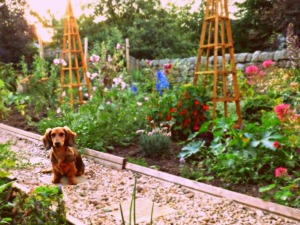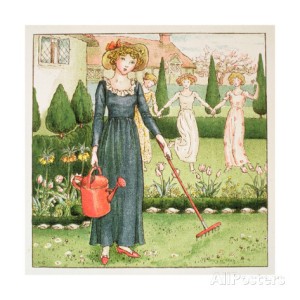 July seems to have whooshed by and the NorthernReader household has spent a pleasingly large amount of it outside in the garden. When we came here a little under two years ago, the garden was not much more than a large square of knee-high grass. Many months of digging allow me to state authoritatively that it must have been some special sort of grass, part insinuating vine and part barbed wire, with roots like coir matting and the survival instinct of bacteria. But paths have been dug – and levelled, and lined with (hah-hah) weed-discouraging membrane, and filled with countless numbers of buckets full of gravel – and beds have been raised, and ponds have been dug, and a shed and a cold-frame have been cobbled together, and all in all things are beginning to look quite gardenish. Where once there were no bees and no butterflies, we are now set fair for Yeats country (bee-loud glades and all that). Time off for good behaviour, I think. What shall I read as, for the first time, I try out the gentler pastime of just sitting in the garden?
July seems to have whooshed by and the NorthernReader household has spent a pleasingly large amount of it outside in the garden. When we came here a little under two years ago, the garden was not much more than a large square of knee-high grass. Many months of digging allow me to state authoritatively that it must have been some special sort of grass, part insinuating vine and part barbed wire, with roots like coir matting and the survival instinct of bacteria. But paths have been dug – and levelled, and lined with (hah-hah) weed-discouraging membrane, and filled with countless numbers of buckets full of gravel – and beds have been raised, and ponds have been dug, and a shed and a cold-frame have been cobbled together, and all in all things are beginning to look quite gardenish. Where once there were no bees and no butterflies, we are now set fair for Yeats country (bee-loud glades and all that). Time off for good behaviour, I think. What shall I read as, for the first time, I try out the gentler pastime of just sitting in the garden?
Clearly we cannot be without Frances Hodgson Burnett’s The Secret Garden. At the risk of appearing a bit like the reviewers at The Field, who rated Lady Chatterley’s Lover as essentially sound on keepering, one of the many joys of The Secret Garden is its perfectly practical horticultural advice. But there is rather more to the tale of Mary Lennox. Happy the reader who, like Mary, can feel their stiff little heart warm to the pleasures of a summer in a paradise (which, as of course you know, is a word that means ‘garden’). This is too idle a time of year to take on Milton and the somewhat stern pleasures of Paradise Lost and Paradise Regained. And great though it undoubtedly is, I am continuing to put off my first encounter with Toni Morrison’s Paradise: gruelling is not what I am seeking today. No, I’d rather turn gratefully to Emile Zola’s Au Bonheur des Dames, translated into English as The Ladies’ Paradise. Sex and shopping in the glittering world of nineteenth-century Paris: how can it possibly have escaped you until now?
 But I drift (I have been known to do this). What I really want for my shelf this week are books about gardens. What about Elizabeth Von Armin’s Elizabeth and her German Garden? As a child, I absolutely adored a rather tattered copy of her The April Baby’s Book of Tunes (complete with Kate Greenaway’s iconic illustrations), never realising what a very full life the author had packed in. Born in Australia to British parents, Mary Beauchamp (Elizabeth was a pen-name) was married first to the Prussian Count von Arnim, a domineering crook who spent time in prison for fraud. The Countess saw parallels between her struggles to make a beautiful garden out of the uncultivated soil of her husband’s country estate with her attempts to integrate with the militaristic Prussian social circles in which she was expected to move. Incidentally, among the tutors she employed for her five children was a young writer called Edward Morgan Forster, or EM as we like to think of him.
But I drift (I have been known to do this). What I really want for my shelf this week are books about gardens. What about Elizabeth Von Armin’s Elizabeth and her German Garden? As a child, I absolutely adored a rather tattered copy of her The April Baby’s Book of Tunes (complete with Kate Greenaway’s iconic illustrations), never realising what a very full life the author had packed in. Born in Australia to British parents, Mary Beauchamp (Elizabeth was a pen-name) was married first to the Prussian Count von Arnim, a domineering crook who spent time in prison for fraud. The Countess saw parallels between her struggles to make a beautiful garden out of the uncultivated soil of her husband’s country estate with her attempts to integrate with the militaristic Prussian social circles in which she was expected to move. Incidentally, among the tutors she employed for her five children was a young writer called Edward Morgan Forster, or EM as we like to think of him.
Thinking of Forster takes us to Italy: all those gorgeous gardens in A Room with a View (lovely Surrey garden too) and Where Angels Fear to Tread. Giorgio Bassani’s great novel, The Garden of the Finzi-Continis, stands as a reminder that Italian fascism was just as deadly as its German counterpart. We do not have to be strict Lacanian critical theorists (although it is quite fun being one, trust me) to spot the significance of the narrator’s long-deferred entry into the garden. The book tells the story of an Italian Jewish family in Ferrara through the nineteen thirties to their inevitable deportation to the concentration camps. The beautiful garden of their manor house becomes a meeting place where the young Finzi-Continis and their friends, Jewish and Christian, can play tennis, fall in love and, for brief moments, detach themselves from the realities of life outside the garden walls. The novel is important, I think: almost as good as Lampedusa’s The Leopard. Reading both stops Italy’s troubled history from slipping quietly out of sight.
And now for some poetry. I do not think we have talked much about Andrew Marvell, which is a shame, because he is one of the very greatest poets Britain has come up with, and I want you to like him as much as I do. The biographical facts might sound a bit unpromising: brought up in Hull, a staunch Cromwellian MP, a civil servant. But wait! There is more to him than that. A good and decent man with the ability to see more than one side of an argument and the courage to express this even in times of political extremism, Marvell is the man who wrote an ode praising Cromwell which nonetheless contains probably the most favourable reflection on Charles the First ever made:
‘He nothing common did or mean
Upon that memorable scene’
He was also a stringent satirist (always a good point in the NorthernReader estimation) who used mockery as a surprisingly powerful weapon in Parliament, during both the Commonwealth and the Restoration. And he argued, powerfully and successfully, against the execution of his friend and colleague, John Milton, thus saving Charles II from at least one mean and despicable act of petty revenge. But for our purposes today, the important thing about Andrew Marvell is that he wrote – well, marvellously – about gardens. He saw them as a private enclosed space – the paradise idea again – in which a man’s true nature could blossom. In that same poem that praised Charles I, which is called ‘An Horatian Ode Upon Cromwell’s Return From Ireland’, he argues of the New Model Army leader that
‘Much to the man is due,
Who from his private gardens where
He liv’d reserved and austere,
As if his highest plot
To plant the bergamot
Could by industrious valour climb
To ruin the great work of time’
Praise? Or satire? Perhaps something of both from this complex, subtle poet. But, as I head out into the garden with my trowel and my kneeler, I am mindful of his picture of Cromwell, a man for whom pottering held no meaning, who could see the dignity and the importance of apparently trivial actions. The seed we plant today will be the tree for future generations. Important, then, that we keep nurturing the love of reading.
